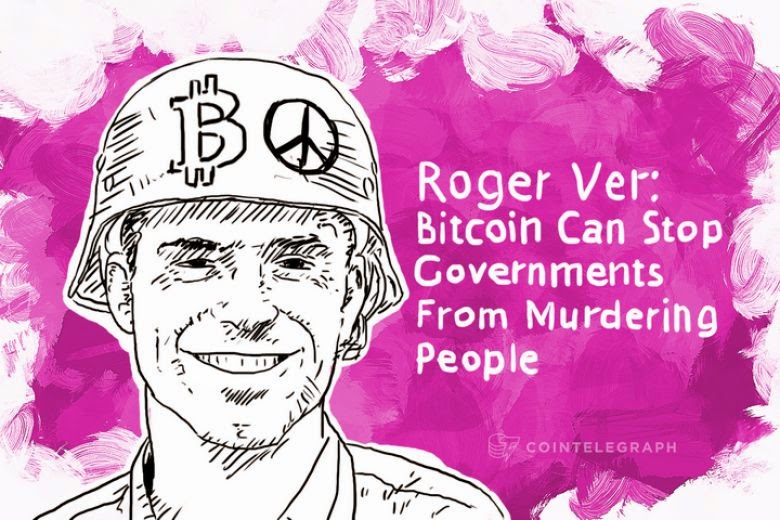Search Results For: singapore

Why Bitcoin is important for the world: Bitcoin can stop governments from murdering people
Bitcoin’s limited growth can stop governments from raging wars across
the world.
Singapore back in May entitled “Why Bitcoin is Important for the World.”
It was a sort of quick introduction into the world of Bitcoin, until
Ver used the last few minutes in his speech to “rant about what has
[him] most excited about how Bitcoin is going to change the world for
the better.”
said that “Not only do they control [fiat], they can print as much of
it as they want at any time. . . I see the United States Government
printing money like crazy and then they use that money to buy all sorts
of tanks and bombs and airplanes and murder people all over the world. .
. all that is being paid for by printing money.”
Bitcoin,” Ver continued “because there is a limited supply, that sort
of thing can’t happen.” Ver hopes that Bitcoin’s inability to be printed
at will, will prevent governments from using printed money to fund
warfare.
possible effect on world peace is something we won’t know until if and
when it obtains true widespread adoption. But it is true that Bitcoin
can’t be printed out of thin air due to a limited supply. If a
government used it as legal tender then they would have to find a
different way to fund any war.
Open your free digital wallet here to store your cryptocurrencies in a safe place.

Seller seeks $2 Million in Bitcoin for real Yukon gold mine
(CoinDesk) The unnamed parent company of a Yukon, Canada, gold mine is now for
sale on high-end bitcoin-only marketplace BitPremier for an asking price
of $2 million in BTC.
price tag includes the gold mine itself and all its associated assets,
including $1 million worth of actual mining equipment, the rights to one
mining property and the lease agreement to another mining lot.
“Any new buyer could recoup their initial investment in as little as two mining seasons.”
listing indicates that the company earns $1m annually in sales and has
the potential to produce 3,000 to 4,000 ounces of gold per year.
a bid to encourage more novice bidders, the current owner further said
he is willing to stay on to manage the property for up to five years to
ensure the operation runs smoothly.
Record-setting sale
Bitcoin meets gold
for its size, the gold mine listing is also indicative of how bitcoin
has become more widely accepted in the precious metals community.
Open your free digital wallet here to store your cryptocurrencies in a safe place.

Bitcoin’s four steps to Wall Street acceptance
its recent rise above the $1,000 mark-is gaining it additional converts
to the belief that the cryptocurrency is for real.
One of the latest skeptics-turned-believers is Ty Danco, a respected
market veteran who has worked up one side of Wall Street and down the
other. Danco once oversaw more than $60 billion of assets and now is the
CEO at a trading firm called BuysideFX.
he outlines what he sees as the future for bitcoin, the digital
currency that last was trading at one unit equaling more than $900.
“The media thoroughly covered its meteoric rise in market value as a
currency, but the bigger story is that high-profile investors have
placed significant bets on Bitcoin-related businesses this year,
including Li-Ka Shing, Union Square Ventures, and Andreessen-Horowitz,”
Danco wrote. “Given their involvement, bitcoin demands a serious look.”
(Read more: Do you really know bitcoin? Here are 11 myths )
this week said it would accept bitcoins for payment-Danco said it faces
four challenges before gaining Wall Street’s acceptance:
It seems bitcoin’s path to legitimacy runs straight through government
and regulatory agencies, quite likely the Commodity Futures Trading
Commission. Says Danco:
Early signs from regulators are more promising than I initially
expected, but we still have a long way to go. CFTC: Bitcoin most likely
falls in your lap, whether as a commodity, currency, or derivative. Take
a stand!
Bitcoin indeed needs to shed its image as a toy created by hobbyists
and nerds. After all the leading bitcoin exchange is Mt.Gox, which is
not an abbreviation for “Mount Gox” but rather an acronym for Magic The
Game: Online Exchange, where folks used to trade cards for a Dungeons
& Dragons-esque game.
I can’t see Prudential Insurance, Vanguard or the Monetary Authority of
Singapore trusting their assets with these kids. Those of you running
Bitcoin exchanges, dump the rhetoric, go hire some pros from SWIFT, the
major credit card companies, central banks, the FSA, etc.
On 2B, bitcoin already has gotten some pretty weighty
endorsements-hedge fund titan Mike Novogratz, for instance-but could
use a little more heft, Danco said.
To get broad buy-in of its legitimacy, Bitcoin needs some sponsorship
by big players. Some well-known VCs have jumped in, but we need one or
two mammoth banks like JPMorgan (JPM) or Deutsche Bank (XETRA:DBK-DE) to come onboard; not shady entities based out of the Caymans
3. Establishing two-way transactions and delivery vs. payment (DVP).
DVP is another byway on the way to legitimacy. It ensures that users of
bitcoin aren’t going to get ripped off on the other end as it requires
payment at the time of delivery for the goods in question.
When a DVP and security registration can be automated via a
decentralized P2P process, Bitcoin takes the banking world by storm.
Finally, to become institutional, Bitcoin requires optional and
verifiable identity opt-ins. Identity for securities settlement
instructions is going to be known in advance before diving into
anonymous-looking alphanumeric strings of private and public keys. (An
exception may be made for dark pool transactions.) My guess is that
institutional “wallets” (read:custody accounts for bitcoin) may have
some identifiable and consistent beginning, then unique and
cryptographic back ends.
While achieving the
four steps will be difficult, it also is very doable, rendering bitcoin
skeptics increasingly into the shadows.
It’s hard
to go against 30 years of habit, but this old dog has converted from
Krugmanesque bitcoin hating to being optimistic about virtual
currencies. It will be time for new tricks soon, but bitcoin needs to
check a few boxes before it’s ready for primetime.
 |
|
Tomohiro Ohsumi | Bloomberg | Getty Images
|
Open your free digital wallet here to store your cryptocurrencies in a safe place.
Bitcoin couple travels the world using virtual cash
“In bitcoin,” Austin Craig repeated to the young woman behind the
counter at the Lean Crust Pizza parlor in the Fort Greene neighborhood
of Brooklyn, N.Y. “Can we pay in bitcoin?”
“In what?” came the reply.
Mr. Craig, 30
years old, was struggling to convince Nadia Alamgir of the existence of
the virtual currency that has gained traction across the world, and
whose value—after months of wild swings—on Wednesday reached records
around $400 per bitcoin.
It was midway through a tricontinental
odyssey taken with his wife, Beccy Bingham-Craig, 29, and a film crew
documenting their travails, which started in Provo, Utah. Their mission:
to live on bitcoin alone.
“It’s been consistently inconvenient
and occasionally frustrating,” Mr. Craig said outside Lean Crust, “but
never impossible.” Lean Crust advertised itself as bitcoin-friendly but
hadn’t seen much virtual foot traffic. Ms. Alamgir eventually contacted
the store’s owner, who arrived and processed the transaction, allowing
Mr. Craig to munch on several slices.
Lean Crust, though, is one
of a tiny but growing number of stores, travel agents and online
merchants starting to accept the once-obscure digital currency as a
means of payment. Bitcoin doesn’t exist, except in the virtual world,
and can only be passed from one person to another electronically. Its
origins are murky: Conventional wisdom says a man or group of people
going by the name Satoshi Nakamoto created bitcoin in 2009, stoking
demand by making it obtainable only through complicated algorithmic
searches by powerful computers.
But in the past 12 months, the
bitcoin zeitgeist has taken on a life of its own. The currency is
discussed at investing conferences now. The Winklevoss twins, known for
their fight with Facebook Inc. founder Mark Zuckerberg, have started a
bitcoin fund. It also has gained the attention of regulators who worry
it can be used to launder money.
For the Craigs, bitcoin represented a chance at adventure—and an underground movie career.
They
began their trek in October by driving east from Provo in Ms.
Bingham-Craig’s 2004 Volkswagen Jetta. After arriving in New York on
Oct 17, they flew to Stockholm, Berlin and Singapore before eventually
returning to Provo. In the end, they lasted 101 days, from July 23 to
Nov 1.
The Craigs weren’t part of the bitcoin underground when
they began the project. Mr. Craig said he first heard of the currency in
2011 and then came up with the plan to live and travel solely on
bitcoin.
“I’m really excited about bitcoin and its future,” Mr. Craig said. “It’s a reimagining of money.”
Starting
July 23, the day they returned from their honeymoon, the Craigs paid
for everything with bitcoin, from rent to food to gas. At that time, one
bitcoin was worth about $98, based on trading at the Tokyo-based Mt.
Gox exchange, a primary exchange bitcoin enthusiasts have tracked.
the trip, they had to not only introduce a number of people to the
fledging currency but to persuade them to use it. After a few weeks of
prodding, their landlord, Justin James, agreed to the plan—with the
sweetener of a small premium over the rent—and set up his own bitcoin
account.
“In the end,” Mr. James said, “it hasn’t been as much of
an inconvenience as I thought it would be.” While he hasn’t become a
convert, he did say he thought the experiment sounded like fun and was
“happy to be a part of it.”
Open your free digital wallet here to store your cryptocurrencies in a safe place.
